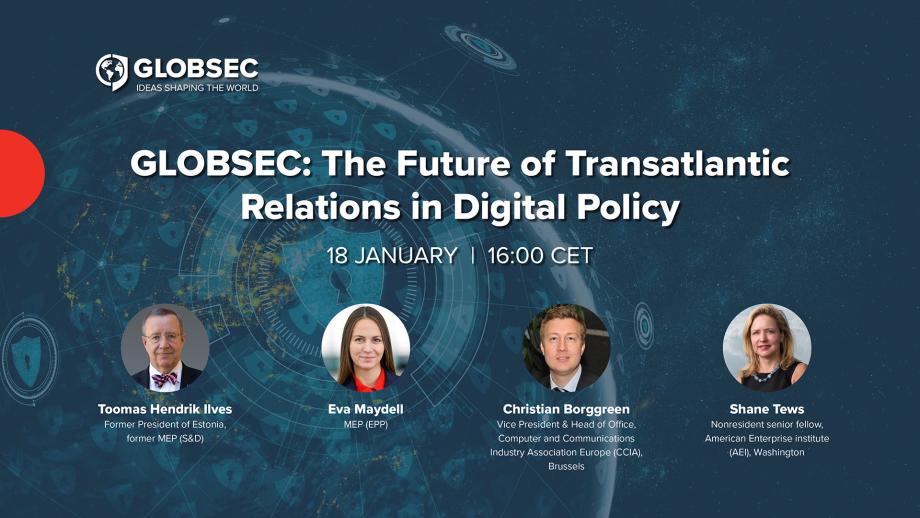18.1.2022 - GLOBSEC: The Future of Transatlantic Relations in Digital Policy

Tuesday, 18 January 2022
4:00 PM - 5:00 PM
Virtual webinar, registration link HERE
Speakers:
- Toomas Hendrik Ilves, former President of Estonia, former MEP (S&D)
- Eva Maydell, MEP (EPP)
- Christian Borggreen, Vice President & Head of Office, Computer and Communications Industry Association Europe (CCIA), Brussels/Washington
- Shane Tews, Nonresident senior fellow, American Enterprise Institute (AEI), Washington
In December 2020, the European Commission presented its new digital legislation proposals. With record speed, the Council and Parliament took their positions in the last two months. At the same time, US Congress is reversing its historically hands-off approach to the internet, by introducing digital legislation bills of their own. The fact that the two blocs have decided to start regulating is the first step towards a common approach. Nevertheless, public discourse and political thinking on both sides of the Atlantic are still guided by different philosophies: In Europe, data security and citizens’ rights are in the center while in the US, freedom of speech is a crucial factor. To bridge the schism of approaches will be difficult, but it’s in the interest of citizens' welfare and economic prosperity.
The US and EU are now taking more, and more fruitful steps forward. Following the appointment of Ms. Khan as Head of the US Federal Trade Commission, Commissioner Vestager is confident that transatlantic cooperation will be intensified in the immediate future. The Trade and Technology Council that they both launched aims to establish a joint framework of cooperation that moves beyond differences and begins to align both regions’ priorities. In 10 working groups, issues like data governance and technical standards should be tackled. However, more steps ought to be taken to align both legislations.
Time is, however, not on the side of the US and EU. If both allies don’t decide to intensify the transatlantic approach towards digital regulation, they risk losing the opportunity to set a standard for the world. There is also a need to think in detail and move away from overly general considerations that are technically pointless. A populist approach to antitrust would cause lasting self-inflicted damage that benefits authoritarian rivals of democracy.
The US and EU should focus on a shared set of values to define the internet. Critical properties of the internet can become the starting point in moving forward, regardless of which particular approach each decides to follow. The result must therefore always lead to the protection of an open, global, and interoperable internet.
In this regard, three questions are important to ask:
- What is needed to intensify transatlantic collaboration on tech policy?
- What will be the ultimate proposed deadline in order to keep up with third countries?
- How can we better involve stakeholders of all kinds from both sides of the Atlantic?
Agenda:
- 4:00 PM-4:05 PM - Welcome and moderation by Roland Freudenstein, Vice-President of GLOBSEC and Head of office, GLOBSEC Brussels
- 4:05 PM-4:35 PM - Moderated discussion with the speakers
- 4:35 PM-4:55 PM - Q&A with the audience
- 4:55 PM-5:00 PM - Summary and closure
If you have more questions regards the webinar, please contact [email protected]